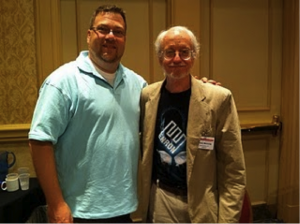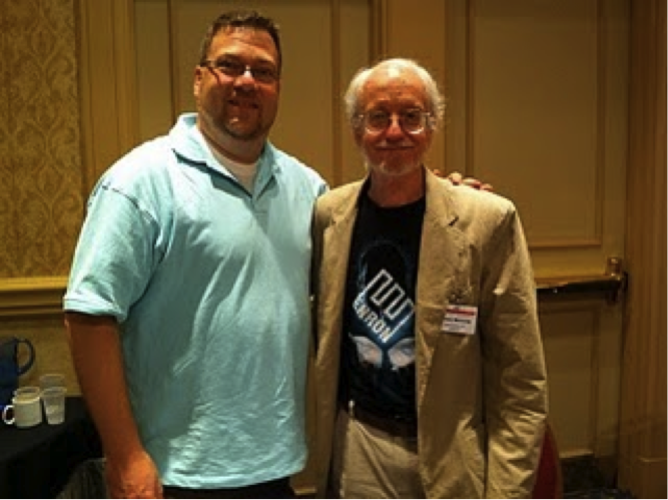The ReaderCON 23 Primer.
xadm


 Starting this evening is my absolutely favorite conference for SciFi and Fantasy – ReaderCON.
Starting this evening is my absolutely favorite conference for SciFi and Fantasy – ReaderCON.
To see last year’s blog from the conference check out this link:
I’ll be joined by friends and fellow writers Leah Petersen and Glenn Skinner.
It’s three days of panels, chats, drinks and laughs. It is one of the most exhausting conferences I’ve ever attended.
And the most fun.
 One of my favorite Dark Fantasy writers and fellow New Englander, Caitlín R. Kiernan, is one of the guests of honor (which reminds me, I need to grab my copy of Silk and my first editions of issues 17-19 of The Dreaming to get them signed).
One of my favorite Dark Fantasy writers and fellow New Englander, Caitlín R. Kiernan, is one of the guests of honor (which reminds me, I need to grab my copy of Silk and my first editions of issues 17-19 of The Dreaming to get them signed).
There some GREAT panels and readings scheduled as always, numerous kaffeeklatsches—intimate gatherings with authors—that I want to attend, plus the “Meet the Pros(e)” party and of course “The 26th Kirk Poland Memorial Bad Prose Competition.”
Not to mention the Shirley Jackson Awards.
I’ll do what I’ve done for the last few years—post periodic updates and photos from the ‘con.
 Tonight (Thursday 12 July) is the “free-sampler” evening. If you are in the Boston area, this evening does not require registration. So head up to the Burlington Marriott. It’s a great way to get an idea of what ReaderCON is all about. I normally skip Thursday and start fresh on Friday morning, however two wonderful authors who I’ve met and stayed in contact with over the years will be read bits from their latest books.
Tonight (Thursday 12 July) is the “free-sampler” evening. If you are in the Boston area, this evening does not require registration. So head up to the Burlington Marriott. It’s a great way to get an idea of what ReaderCON is all about. I normally skip Thursday and start fresh on Friday morning, however two wonderful authors who I’ve met and stayed in contact with over the years will be read bits from their latest books.
Peter Dubé will be reading from The City’s Gates and Yves Meynard will read a bit from his latest Chrysanthe.
Here is the full Thursday evening schedule:
Thursday July 12
- 8:00 PM F Unfinished Symphonies. Erik Amundsen, C.S.E. Cooney (leader), Maria Dahvana Headley, Natalie Luhrs, Sarah Smith. One of George R. R. Martin’s fans threatened to camp out at the author’s house with a shotgun and an espresso machine until Martin buckled down and finished A Song of Ice and Fire. Recent years have seen Robert Jordan’s Wheel of Time continued by Brandon Sanderson, a fourth book in Mervyn Peake’s Gormenghast completed (from only a fragment) by Maeve Gilmore, and younger writers completing some of Philip Jose Farmer’s works, for only a few examples. Are such projects merely opportunistic attempts by publishers to extend a franchise, an exalted form of fanfic, or legitimate works of creative literary scholarship? Should unfinished series remain unfinished, or should the reader’s (and bookseller’s) desire for more trump notions of literary “purity”? And why do readers care so much about seeing series through to the end?
- 8:00 PM G Genrecare. Elizabeth Bear (leader), Kathleen Ann Goonan, Kelly Link, Shira Lipkin. In a 2011 review of Harmony by Project Itoh, Adam Roberts suggests that “the concept of ‘healthcare’ in its broadest sense is one of the keys to the modern psyche.” Yet Roberts notes “how poorly genre has tuned in to that particular aspect of contemporary life.” Similarly, in the essay “No Cure for the Future,” Kirk Hampton and Carol MacKay write that “SF is a world almost never concerned with the issues of physical frailty and malfunction.” As writers such as Nalo Hopkinson, Tricia Sullivan, and Kim Stanley Robinson explore the future of the body, how is SF dealing with the concepts of health, medicine, and what it means to be well?
- 8:00 PM ME Managing Motivation to Write. Alexander Jablokov, Steve Kelner (leader), Toni L.P. Kelner, Matthew Kressel, Ben Loory. Kipling (an SF writer himself) wrote: “There are nine-and-sixty ways/of composing tribal lays/and every single one of them is right!” Science fiction writers should know this better than most, yet most people don’t realize just how different the creative process is for different writers. Join a panel of writers discussing how they keep themselves going, the underlying reasons for why a given tactic works for them, and how it might (or might not) work for others. ?Proposed by Stephen Kelner.
- 8:00 PM RI No Longer Lonely in the Cloud: Digital Collaboration for Readers. Jim Freund, Erin Kissane (leader), John Edward Lawson, Graham Sleight. MORE Magazine has created a multi-city book club via group video call. Writers who used to hang out in cafes are now using Google+ hangouts as virtual coworking space. In2Books matches up kids with distant adult pen pals specifically for the purpose of discussing books. Kindles and Readmill let you share your marginalia with your friends. How are new concepts of socializing and togetherness affecting the ways we read, write, and talk about literature?
- 8:00 PM NH Reading. Kit Reed. Kit Reed reads one of the new stories from The Story Until Now, her “best-of” collection forthcoming in 2013.
- 8:00 PM VT Reading. Peter Dubé. Peter Dubé reads from the novel The City’s Gates.
- 8:30 PM NH Reading. Yves Meynard. Yves Meynard reads from his new fantasy novel, Chrysanthe.
- 8:30 PM VT Reading. Darrell Schweitzer. Darrell Schweitzer reads “The Corpse Detective.”
- 9:00 PM F The Visual Generation. Gemma Files, Elizabeth Hand, Caitlín R. Kiernan, John Langan (leader), Lee Moyer. Last year’s horror-related Readercon panels all brought in discussions of other media. Many of today’s horror and dark fantasy writers were exposed to horror movies and television before ever picking up a horror novel. In a 2010 book review, horror critic Will Errickson wrote, “I can’t imagine what it must have been like for authors such as Arthur Machen, H.P. Lovecraft, Algernon Blackwood, M.R. James, Sheridan LeFanu, et al., to write horror fiction without having horror film as an influence.” Yet despite these undeniable changes in the field, readers often disparage horror writing when they feel it tries too hard to be “cinematic,” or when an author openly admits to being inspired by visual media. Is it time for us to get over this stigma and accept that horror literature and visual media are in an ongoing two-way conversation? Or are we in danger of diluting the craft and consigning the genre’s past masters to obscurity unless they’ve been adapted to film?
- 9:00 PM G Why Is Realistic Fiction Useful? Daniel Abraham, Nathan Ballingrud, Grant C. Carrington, Liz Gorinsky (leader), Alexander Jablokov. In a 2011 blog post, Harry Connolly wrote, “If I want to understand the horrors of war, the pain of divorce, the disappointment of seeing a business fail, I don’t need to read fiction. There’s non-fiction on that very subject…. So forget about justifying the utility of fantasy. How do people justify the utility of realism?” Tim O’Brien’s The Things They Carried distinguishes between “story truth” and “happening truth”; O’Brien feels that fictionalizing some aspects of his own experience makes them more universal. On the other hand, reality TV, Photoshop, and CGI have proven how blurry the line between fiction and non-fiction can be. How do we tease out these distinctions, and what is realistic fiction’s place in the literary landscape?
- 9:00 PM ME Randomness, Relativity, Reality, and Free Will. Eric M. Van. As the physics world struggles to develop a Theory of Everything, it is increasingly faced with four big questions. Is quantum mechanics, with its inherent randomness, ultimately true, or does it derive from deterministic processes in some deeper layer of reality? Is relativity ultimately true, or is there a deeper layer of reality where there is an absolute standard of simultaneity and frame of reference? Is there an objective reality independent of conscious minds, or do conscious minds somehow determine reality at least in part? And do beings with conscious minds have true free will that somehow supersedes causal laws? It turns out that the four questions are intimately related to one another in all sorts of fascinating ways, so that answers to some questions pose difficulties for, or even rule out, certain answers to others. Eric M. Van will attempt to narrow the set of answers down as far as possible, deriving a set of possible ultimate realities to believe in.
- 9:00 PM RI How Fantastic Is Fantasy? Erik Amundsen, Ron Drummond, Andy Duncan, Katherine MacLean (leader), Faye Ringel. Audience members discuss events of supernatural import that we ordinarily keep locked in the closet: luck, coincidences, things that go bump in the night, telepathy and precognition, visions and dreams. Many people have had Experiences, but no one wants to look like a nut. In this discussion, we’ll let loose and explore our personal experiences of the places where reality gets weird.?Proposed by Katherine MacLean.
- 9:00 PM NH Reading. Kathleen Ann Goonan. Kathleen Ann Goonan reads her short story “A Love Supreme,” which will appear in Discover this October.
- 9:00 PM VT Reading. F. Brett Cox. F. Brett Cox reads “The Amnesia Helmet,” a new short story.
- 9:30 PM NH Reading. Jennifer Pelland. Jennifer Pelland reads from her novel Machine.
- 9:30 PM VT Reading. Toni L.P. Kelner. Toni L.P. Kelner reads from her story “Pirate Dave’s Haunted Amusement Park,” published in Death’s Excellent Vacation

